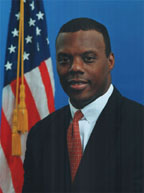A Climate Change Policy For America
By J.C. Watts, Jr.
 |
Farmers in Elk City, Oklahoma woke up this morning to the tough job of nurturing their wheat crop through another month of drought. As a Member of Congress from Oklahoma, I can tell you those farmers will not complain. They will do their job. And so will I. I will work to ensure those farmers are best served by the federal research programs on climate change. But the current program is failing the farmers of Elk City.
Oklahoma suffers our share of extreme weather events. Drought isn't the only plight; the last five years have seen a record number of tornadoes wreak havoc. But my state isn't unique. The rest of the country also faces disastrous weather events. In fact, while the nation's center has been struggling through drought, some of the East Coast has endured record floods. Last summer, the citizens of Grundy, Virginia saw the Levisa River roar down their main street.
As the nation struggles to cope with these weather cataclysms, the federal Global Change Research Program has focused on calculating if increasing carbon dioxide in the atmosphere will cause more extreme weather events 100 years from now. That work is important. But, my congressional colleagues and I share a common concern: without greater resiliency, some of our towns won't last 100 more years.
As important as it is to refine long-term computer predictions, it will not stem the floods in Grundy or make the crops more drought resistant in Elk City. These towns need better methods to be more resilient to extreme weather.
They need the federal government to help them assess their vulnerability to extreme weather events. Then, they need options that minimize the threat to life and property, improve their resilience to, and reduce the economic impacts of, extreme weather events — regardless of their cause.
The federal Global Change Research Program seeks to understand long-term climate change, and the extent to which human activities contribute to these changes, but federal programs must also begin researching strategies that can immediately help Elk City, Grundy and thousands of other vulnerable towns scattered across the country deal with extreme weather.
Call it a "no regrets" strategy. It is a strategy that best serves America. It is a climate policy that can be enacted right now, in absence of a scientific agreement on the magnitude and extent of the impact on the climate of increasing carbon dioxide in the atmosphere. And, it is a policy that recognizes that many things can contribute to a community's vulnerability, including changing demographics and shifts in the nation's wealth distribution.
I fully support our nation's scientific effort that seeks to understand the effect of increasing carbon dioxide on the future climate. That work will continue. In fact, President Bush has been using the results of that research to develop his recently announced policy of carbon reduction. His policy has carefully considered the scientific findings as well as our nation's economic interests. As the scientific predictions become more precise, the president will advance the policy appropriately.
I challenge our best scientists to turn some of their attention to shorter-term climate and weather variations and produce the kind of assessments and resiliency research that can help the farmers in Elk City and town planners in Grundy.
I plan to introduce legislation in the House of Representatives that would create an Office of Vulnerability and Resilience Research that would coordinate vulnerability research across the U.S. Global Change Research Program.The office will assess those regions of the U.S. that are the most vulnerable to climate change and climate variability. And it will fund scientific research that will lead to greater resiliency.
The office will be charged with examining:
- severe weather events;
- annual and interannual climate events, such as the El Nino Southern Oscillation;
- sea level rise and shifts in the hydrological cycle;
- natural hazards, including tsunami, drought, flood and fire;
- and alteration of ecological communities.
As a result of this program, I foresee a stronger partnership between scientists at the cutting edge of climate research and city planners who are on the front lines of the battle with nature's violent side.
Unfortunately, the citizens of Grundy couldn't wait for the results of this program. The rising waters have forced them to make a quicker decision. Lacking other options, the town decided to blast the top of a mountain off on the other side of the Levisa River. When that new space is cleared they will pack up every home, shop and stop light and move across the river.
The citizens of our nation's most vulnerable communities must have more options than simply packing up and moving. When this program is established and some of the nation's best scientists are working to provide solutions to local planners, our country will be better served. When people know what to expect, I know that they will make the right choices for themselves and their children. While we must continue to anticipate and solve the challenges of tomorrow, let's get to work on the problems of today.
Rep. J.C. Watts, Jr. (R-Oklahoma) is chairman of the House Republican Conference.
©1995 - 2024, AMERICAN PHYSICAL SOCIETY
APS encourages the redistribution of the materials included in this newspaper provided that attribution to the source is noted and the materials are not truncated or changed.
Associate Editor: Jennifer Ouellette
May 2002 (Volume 11, Number 5)
Articles in this Issue

